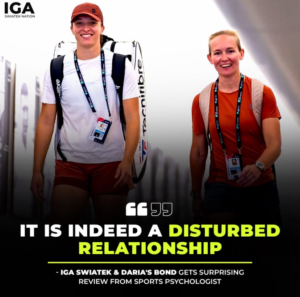Iga Swiatek’s collaboration with sports psychologist Daria Abramowicz has been pivotal in her ascent to the pinnacle of women’s tennis. Since their partnership began in 2019, Swiatek has clinched five Grand Slam titles, often attributing her mental resilience and on-court success to Abramowicz’s guidance. However, the depth of their association has recently come under scrutiny from certain quarters.
Prominent Polish sports psychologist Dariusz Nowicki has expressed reservations about the closeness of Swiatek and Abramowicz’s relationship. In an interview with Interia Sport, Nowicki remarked that their bond appears “disturbed,” suggesting that it lacks the “professional distance” typically maintained between a psychologist and their client. He emphasized that heightened emotions, whether positive or negative, can impair objective judgment, underscoring the necessity for psychologists to remain detached to function effectively within their professional competencies.
Echoing this sentiment, former Polish ATP player Jerzy Janowicz commented on the nature of their association, stating, “I’d rather call her a friend than a psychologist.” He highlighted that most top-tier psychologists working with elite athletes tend to remain discreet, often operating behind the scenes without drawing attention. Janowicz expressed skepticism about blending friendship with professional psychological support, emphasizing that maintaining distance is crucial to prevent personal relationships from interfering with therapeutic objectives.
In response to such critiques, Swiatek has been forthright in defending her partnership with Abramowicz. She addressed the criticisms by asserting that those commenting on her relationship with Abramowicz are uninformed about her personal and professional life. Swiatek emphasized that their collaboration is both professional and personal, with clear boundaries ensuring that their close rapport does not compromise the effectiveness of their work. She underscored that Abramowicz’s comprehensive involvement in her career has been instrumental in her development both on and off the court.
The discourse surrounding Swiatek and Abramowicz’s relationship brings to light the broader conversation about the evolving role of sports psychologists in athletes’ lives. While traditional perspectives advocate for a clear demarcation between professional support and personal involvement, contemporary approaches recognize the benefits of a more integrated relationship, tailored to the unique needs of the athlete. As Swiatek continues her illustrious career, her partnership with Abramowicz may serve as a case study in redefining the dynamics between athletes and their mental health professionals.